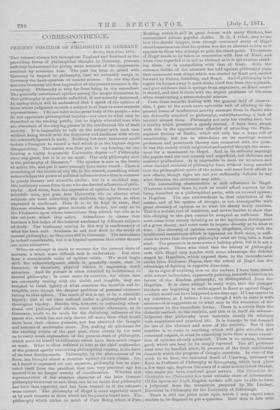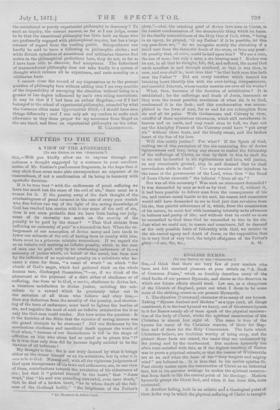CORRESPONDENCE.
PRESENT POSITION OF PHILOSOPHY IN GERMANY.
Berlin, 24th June, 1871.
TUE interest always felt throughout England and Scotland in the prevailing forme of philosophical thought in Germany, presents sufficient inducement for giving some account of the impressions received by residence here. The past has been so grand with Germany in respect to philosophy, that we naturally assign to Germany the head-quarters of mental science. To one who thus honours Germany the first impression at the present moment is dis- couraging. Philosophy is very far from being in the ascendant.
The generally entertained opinion among the people themselves is, that philosophy is meanwhile enfeebled, if not actually dethroned. In saying this,it will be understood that 1 speak of the opinion of those whose judgment on such a subject is at least in some measure representative. I do not refer to the great body of the people —who do not appreciate philosophical inquiry—nor oven to what may be described as the reading public, but to highly educated men who are observant of the varying phases in the intellectual life of their country. It is impossible to talk on the subject with such men without being struck with the frequency and readiness with which the acknowledgment is made. Nothing but such testimony could induce a foreigner to record a fact which is in the highest degree disappointing. The matter was thus put, in my hearing, by one bearing a highly honourable University degree:—" Philosophy once was great, but it is so no more. Our only philosophy now is the philosophy of Bismarck." The speaker is now in the bustle of active life, and put it more strongly than many would. There is something of the breath of city life in the remark, something which acknowledges the power of political influences more than is common in purely literary and scientific circles ; but in a modified way, this•testimony comes from those who are devoted adherents of philo- sophy. And when, from the expression of opinion by literary and scientific men, you pass into University life to observe what subjects are most attracting the students, the opinion so often expressed is confirmed. Here it is to be kept in view, that German students have great latitude of choice, not only as to the Professors upon whose instructions they attend, but also as to the subjects which they select. Attendance in classes thus becomes a fair index of the interest awakened by different subjects of study. The testimony coming in this way is confirmatory of what has been said. Students do not now flock to the study of mental philosophy, as they once did in Germany. The attendance is indeed considerable, but it is beyond question that other themes are more attractive.
When an attempt is made to account for the present state of matters, a much more difficult task is undertaken. But even here a considerable unity of opinion exists. We must begin with the acknowledgment which is generally made, that in Germany, as elsewhere, physical science is engrossing much attention. Aud its pursuit is often attended by indifference to mental philosophy ; in some cases by aversion, for where men are constantly dealing with the visible and tangible, they are tempted to think lightly of what concerns the invisible and in- tangible, even though the deepest problems of personal existence belong to that sphere. The result of this is apt to be a scientific bigotry, just as we have suffered under a philosophical and a theological bigotry. Besides this, however, in estimating educa- tional and philosophical affairs, some special allowance, as to Germany, needs to be made for the disturbing influence of the recent war, which has not only drawn off many from what would have been their chosen pursuits, but has absorbed the thought and interest of multitudes more. Yet, making all allowance for the exciting events of the past year, these events lie too near us to carry much explanation of the present state of philosophy, which must be traced to influences which have been much longer at work. What is often referred to here as the chief explanation of the present apathy concerning philosophical inquiry, is the form of its later developments. Philosophy, by the abstractness of its form, has brought about a reaction against its own claims. Or, as I heard it expressed on one occasion, philosophy has so sepa- rated itself from the practical, that this very practical ago has treated it as no longer worthy of consideration. Whether this representation of the abstract character of the later German philosophy be correct or not, there can be no doubt that philosophy has been thus regarded, and has been treated as if the estimate were correct. The philosophy of Hegel is more especially aimed. at by such remarks as those which are frequently heard here. The philosophy which makes so much of Pure Being which is Pure readers to be disposed to put a question. How does it fare with Nothing, which is still iu great favour with many thinkers, has encountered serious popular dislike. It is, I think, easy to see• how this should happen, oven though continued study of Hegel should convince one that his system was not so abstract to him as it appears to those who attempt to gain his stand-point. The system• of Hegel needs to be taken in connection with that of Kant, and when thus regarded it is not so abstract as it is apt to seem stand- ing alone, or in competition with that of Kant. Still, the common dislike of the abstract has told against philosophy since• that movement took shape which was started by Kant and carried forward by Fichte, Schelling, and Hegel. And if philosophy is to. regain its former sway it must shake itself free from this reproach, and give evidence that it springs from experience, as Kant meant it should, and that it deals with the urgent problems of life even• when constructing a transcendental science.
From these remarks dealing with the general field of observa- tion, I pass to the much more agreeable 'task of alluding to the present forms of intellectual activity amongst those in Berlin who. lire devotedly attached to philosophy, notwithstanding a lack of interest around them. Philosophy not only has vitality here, but a vitality which promises a speedy revival. I have been struck. with this in the opportunities afforded of attending the Philo- sophical Society of Berlin, which not only has a large roll of membership, but has in attendance on its meetings several professors and prornineut literary men connected with the press. It was this society which originated and carried through the move- ment for a monument to Hegel. And in its ordinary meetings the papers read are not cursory and superficial, but elaborate and. matured productions. It is impossible to meet its members and other devoted students of philosophy here, without being satisfied that the philosophical spirit of the nation will come forth afresh in. new efforts, though signs are not yet sufficiently definite to say what direction the movement may take.
The outstanding characteristic is still adherence to Hegel. Whatever cohesion there is, such as would afford warrant fey its being described as a philosophical party, with an avowed system, is Hegelian. The one awkwardness is, that admiration of the master, and of his system of thought, is not incompatible with. great diversity of opinion as to what his theory really involves.„ This is a serious sort of weakness, and serves besides to show that this clinging to the past cannot be accepted as sufficient. Med must cease from merely debating as to the legitimate development of a given theory, and must come to inquire directly as to what is• true. The diversity of opinion among Hogelians, along with the intellectual earnestness which is apparent on both sides, is suffi- cient to prove that German philosophy must ere long take a fresh. start. The present is in some sense a halting-place, but it is not a. resting-place. Those who think that the history of philosophy ends with 'Hegel may ponder with some advantage the debates, waged by Hegelian, which exposed them to the uncomfortable- stroke from Professor Ilanns, that the school of Hegel has the- advantage of fighting in opposite directions.
As to signs of anything new on the surface, I have been struck- with several indications, apparently pointing towards a reaction in favour of the Kautian philosophy, as distinguished from the- Hegelian. It is clear enough in many ways, that time younger- thinkers are beginning to make appeal to Kaut as against Hegel,. —which would not have happened some time ago. If I am correct
my inference, as I believe I am—though I wish to state it with- reserve—it is suggestive as to what may be the character of the- movement in the immediate future. There is a return from the- dialectic method, to the analytic, and this is in itself an acknows ledgment that philosophy must maintain closely its relations- with experience and practical life. It is homage to the demand for less of -the abstract and more of the realistic, But if this- reaction is to come to anything which will gain attention and command respect, it must be something more than a mere exposi- tion of systems already advanced. There is no system, however. good, which can bear to be simply repeated. The old problems. must ever be handled anew, in presence of the fresh intellectual, demands which the progress of thought occasions. In view of the work to be done, the lamented death of Uberweg, successor of Kant as Professor of Philosophy at Ktiumgsberg, which took place, a few days ago, deprives Germany of a most accomplished thinker,. who might yet have rendered great service. His Grundriss der• Geschichle der Philosophic is a most valuable store of information.. Of his System der Logik, English readers will now be able to ferns a judgment from the translation prepared by Mr. Lindsay, Examiner in Philosophy for the University of Edinburgh.
There is still one point more upon which I may expect some the sensational or purely experiential philosophy in Germany ? To /such an inquiry, the correct answer, so far as I can judge, seems to be that the sensational philosophy has little hold on those who are professedly engaged with philosophical inquiry, but has a large amount of regard from the reading public. Schopenhauer can hardly be said to have a following in philosophic circles ; and while British upholders of sensational and utilitarian theories find notice in the philosophical prelections here, they do not, so far as I have been able to discover, find acceptance. The fatherland of transcendental philosophy does not take kindly to a system of thought which reduces all to experience, and rests morality on a utilitarian basis.
I cannot close the record of my impressions as to the present position of philosophy hero without adding that I am very sensible of the impossibility of surveying the situation without being to a :greater or less degree influenced by one's own ruling convictions. It may be that if I had been an ardent Hegeliam—or if I had belonged to the school of experiential philosophy, attended by what the Germans often name Opportunititts Ethik..,—I should have seen things differently ; and I can only ask my readers to make such ,allowance as they deem proper for my severance from Hegel on the one hand, and from an experiential philosophy on the other. H. CALnEnwoon.



































 Previous page
Previous page